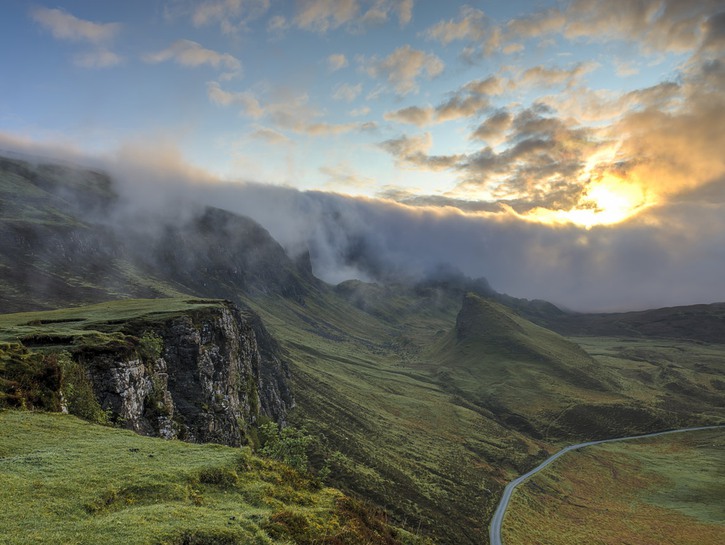
As we all become increasingly aware of the dangers our lifestyles pose to the environment, many of us are choosing to be eco-conscious in our travels. Here are the best destinations for those who want to explore the earth without harming it.
1. Ecuador
Ecuador is one of the most eco-friendly countries in the world, treating its environmental issues as a national priority and even formally recognizing the rights of nature within its constitution. It has been the recipient of the National Travel Awards’ title of World’s Leading Green Destination for four years in a row.
Ecuador is one of the countries listed as “megadiverse,” meaning it has one of the highest levels of biodiversity in the world. Visitors to Ecuador can encounter hundreds of native species, both on the mainland and on the famous Galapagos Islands off the coast, which inspired Charles Darwin in his development of the theory of evolution. The country is also home to a large indigenous population and is committed to the preservation of their culture and way of life.
Tourists have plenty of opportunities to engage with both Ecuador’s nature and its traditional culture through special tours, which prioritize sustainability and respect of nature above all else.

Beautiful, natural Ecuador. Unsplash / Claudio Testa
2. Scotland
From the vast expanse of Cairngorms National Park, where you can come face-to-face with 25% of Britain’s threatened species, to the rugged mountain views on the Isle of Skye, there are few places in the world that are truly as wild as the highlands and islands of Scotland. There are plenty of eco-conscious ways to discover the country, including some epic walking and cycling routes that take you to the heart of the action.
Regarding accommodations, Scotland is way ahead of the curve. The highlands and islands are dotted throughout with bothies, basic stone shelters designed to welcome any traveler who wishes to use them, for free. For the more adventurous, Scotland is also fully open to wild camping, meaning anyone is welcome to camp anywhere in the country’s wilderness, as long as they promise to respect the area and “leave no trace.” For the less outdoorsy, there are also plenty of eco-lodges ranging from simple two-person pods to state-of-the-art modern cabins.

The Isle of Skye.
3. Rwanda
The landlocked African nation of Rwanda is experiencing a tourism boom, as more and more people discover everything the “Land of a Thousand Hills” has to offer. Best known until recently for a horrific genocide in 1993-94, today the country is healing with an incredibly forward-thinking approach to environmental conservation: the last Saturday of every month is umuganda, a day where every citizen is expected to dedicate a few hours to cleaning and maintaining their community. Due to this and several other initiatives, Rwanda is one of the cleanest countries in Africa.
For eco-tourists, the main draw is undoubtedly the wildlife, particularly the endangered mountain gorillas found in Rwanda’s Volcano National Park. Visitors can trek into the mountains to spend time with the gorillas, but the tours are organized in a responsible fashion so as not to be disruptive to the animals. Eco-lodges abound around the park, and this industry has created many jobs for locals, including for former poachers who now profit more from saving the gorillas than killing them.
4. Singapore
Singapore’s commitment to nature is one of the most impressive things about an extremely impressive city/nation. It ranks as the best-performing country in Asia on the Environmental Performace Index and is 14th in the world. This is partly due to Singapore’s continuous attempts to become The City in a Garden, a high-tech blend of cosmopolitan urban living and verdant paradise.
The government has launched various initiatives such as rainwater collection points, wastewater recycling, and the installation of multiple green public spaces, such as the famous Gardens by the Bay with iconic “supertree” structures. Additionally, many of the city’s buildings and skyscrapers are being built or remodeled to reflect the latest in eco-friendly construction.
Singapore also shows that eco-tourism doesn’t have to mean staying in a hut: there are several luxury hotels and resorts across the city built on the principles of energy conservation and the importance of green spaces.

Singapore. Pixabay / monikawl999
5. Iceland
Though all Scandinavian countries are exceptionally eco-friendly, Iceland combines this commitment to the planet with some of the world’s most striking landscapes anywhere. Its one-of-a-kind geography is due to Iceland hosting hundreds of volcanoes and thermal springs, as well as glaciers, waterfalls, fjords, and the breathtaking spectacle of the Northern Lights. Even the country’s capital, Reykjavik, is a pinnacle of eco-consciousness, with 95% of its heating and electricity coming from renewable geothermal energy.
Visitors to Iceland have a vast range of eco-friendly lodgings to choose from, including hotels, hostels, cabins, and camping sites. Wild camping is also possible but is probably best reserved for the hardiest and most experienced of campers, due to the country’s glacial temperatures.
With the continuing rise of climate change and the ongoing draining of the earth’s natural resources, it is more important than ever for travelers to respect the countries we visit. By focusing on sustainability, these eco-friendly countries are ensuring that tourism is enriching and supporting their nature, people, and culture, thus preserving them for future generations to enjoy and learn from.
